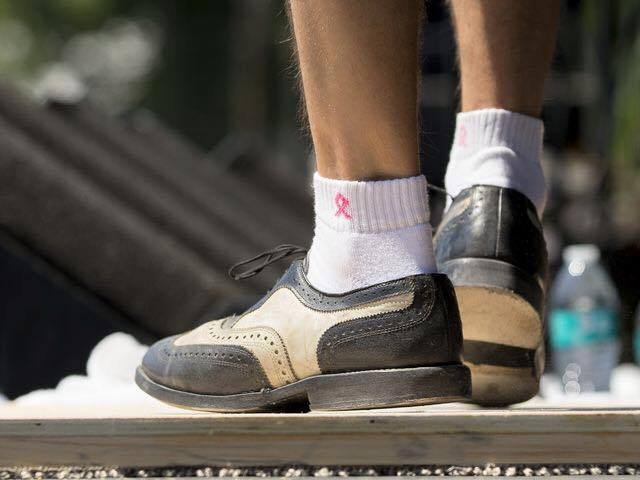Image Credit: "Feet Got Wings" Photo by Ithica Journal, 2015.
Join us Thursday, March 24 at 6 pm for an Introduction to Appalachian Flatfoot and Percussive Dance.
This program will be one part lecture, one part demonstration, and one part memoir.
Percussive dance exists in musical traditions around the world. The dancer will use the ball of their toe, heel, or whole foot to strike the ground on the downbeat of the rhythm as a way to accompany musicians and keep the beat. The Appalachian Mountain Region is home to many distinct forms of percussive dance and this program will focus on flatfoot dancing in the style of Willard C Watson Sr (1905-1995) and the Precision Clogging Steps of the Green Grass Cloggers (1971-Present).
The presentation will be led by North Carolina Appalachian Folklife Apprenticeship Team, Rodney Sutton, and Willard C. Watson III.
About the Speakers:
Rodney Sutton has been performing and teaching traditional Appalachian step-dance for over 40 years, first with the two-time World Champion Green Grass Cloggers and then as co-founder of the Fiddle Puppets(now known as Footworks). Rodney prides himself on being able to teach anyone Appalachian Clogging and flat-footing steps that will turn them into their own percussive dancer and allow them to be a foot drummer to any kind of music! Rodney is an adjunct professor in East Tennessee State University’s Bluegrass, Old-Time, and Country Music Studies program.
As the 2012 recipient of Asheville’s Folk Heritage Committee’s Sam Queen Award, Rodney has found no lack of motivation to keep his feet moving. With the support of the first-ever South Arts Folk and Traditional Master Artist Fellowship, Sutton spent the month of September 2019 in Ireland exploring the roots of his flat foot style by learning from Sean-nós dancers in Ireland who share his passion for preserving, performing, and passing down their vibrant step-dance traditions.
Willard Watson, Originally from Fayetteville, North Carolina, Willard moved to Boone in 2008, but his roots run deep in Watauga County. His great-grandfather and namesake, Willard Watson I, was a well-known toy carver, moonshiner, and dancer.
Willard has a Masters in Appalachian Studies with a concentration on Sustainability and a Bachelors of Science in Sustainable Development both from Appalachian State University. Since 2010 Willard has been an active member of the High Country community through volunteerism and event planning. He has worn many hats in the area with a variety of organizations such as the Doc & Rosa Lee Watson MusicFest ‘n Sugar Grove, Sustain Appalachian, Center 45 Climbing & Fitness, High Country Local First, the Watauga Food Council, and the High Country Beer Fest. His academic and volunteer passions intersect on the topic of cultural preservation and community development through the creative arts.
He is a member of the 2020-2022 class of the William C. Fridays Fellowship for Human Relations and the 2020-2021 NC Appalachian Folklife Apprenticeship Program.
About the NC Appalachian Folklife Apprenticeship Program:
The North Carolina Appalachian Folklife Apprenticeships program, launched in 2019, supports 12-month apprenticeships in the folk and traditional arts of the many cultural communities within the state’s Appalachian Regional Commission counties. South Arts funds the program through its In These Mountains: Central Appalachian Folk Arts & Culture Initiative.
Mentor artists are tradition-bearers committed to the perpetuation of a traditional art form or practice of their cultural heritage. Mentor artists are recognized by fellow artists and their own community members as skilled and dedicated practitioners. Apprentices are dedicated students whom mentor artists have chosen for a sustained period of study in their art form or practice. Throughout the apprenticeship, the mentors and apprentices document and publicly present their work together within their communities.
For more information about the Folklife & Traditional Arts program of the N.C. Arts Council, visit https://www.ncarts.org/discover/folk-traditional-arts.
About the North Carolina Arts Council:
The North Carolina Arts Council builds on our state’s long-standing love of the arts, leading the way to a more vibrant future. The Arts Council is an economic catalyst, fueling a thriving nonprofit creative sector that generates $2.12 billion in annual direct economic activity. The Arts Council also sustains diverse arts expression and traditions while investing in innovative approaches to art-making. The North Carolina Arts Council has proven to be a champion for youth by cultivating tomorrow’s creative citizens through arts education. NCArts.org.

